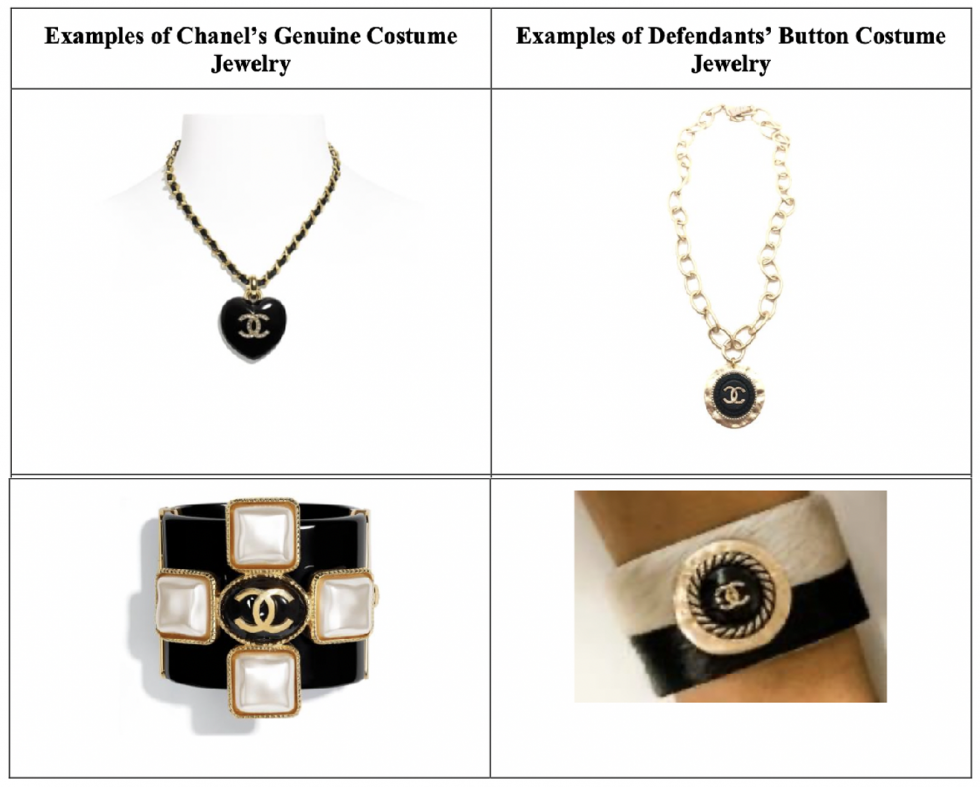Chanel has prevailed in the latest round of a lawsuit over jewelry crafted from upcycled buttons bearing its famous branding. In the wake of Defendant Shiver + Duke (“S+D”) filing a motion to dismiss for lack of personal jurisdiction or to transfer venue, and Chanel being granted leave to conduct jurisdictional discovery on the scope and extent of the defendants’ activities directed at New York, Judge May Kay Vyskocil of the U.S. District Court for the Southern District of New York refused to grant S+D’s motion. According to the court, the Atlanta-based jewelry-maker – which crafts jewelry from “authentic, recycled, and repurposed” Chanel buttons – has not only transacted enough business in New York state to subject it to litigation there but has failed to sufficiently show that the case should be transferred to a federal court in Georgia.
Laying the groundwork in her August 30 opinion and order, Judge Vyskocil states that Chanel initiated the lawsuit against S+D, alleging that in selling jewelry featuring Chanel’s CC monogram S+D is on the hook for federal and state law trademark infringement, unfair competition, and trademark dilution. On the heels of Chanel filing suit in February 2021, S+D argued that the case should be tossed out on the basis that Chanel lacks the necessary personal jurisdiction over it in New York state. According to S+D, while it maintains an e-commerce site, where it sells the allegedly infringing jewelry, which is accessible to consumers across the U.S., including New York, and while it has, in fact, sold products to consumers in New York by way of that website, Chanel, nonetheless, chose the wrong forum to file suit.
“All of Defendants’ business activities occur in the State of Georgia,” S+D asserted in its May 2021 motion to dismiss, arguing that its “only perceptible business activity in New York is that its website is accessible from New York,” and even then, its “sales and shipment of the repurposed jewelry giving rise to this matter within the State of New York comprised 0.129 percent of [its] total sales from 2019-2021.” Additionally, S+D claimed that convenience and the balance of equities weighs in favors of transfer because S+D is a small, single-person company with limited resources that will suffer substantial financial hardship if required to litigate hundreds of miles away in New York.

Siding with Chanel across the board, Judge Vyskocil primarily finds that S+D and its owner Edith Hunt are subject to personal jurisdiction in New York, citing Second Circuit precedent that “a plaintiff’s showing that a single transaction occurred in New York is sufficient to invoke jurisdiction, even [if] the defendant never enters New York, so long as the transaction was ‘purposeful’ and there is a ‘substantial nexus’ between the business and the cause of action.” Given that S+D operates “a highly interactive website that offers the allegedly infringing goods for sale to consumers” in New York and has “made more than 80 sales total to customers in New York, totaling in excess of $10,000 in revenue” in the last three years, the court states that such facts are “more than sufficient to establish” that both S+D and Hunt, who is also named as a defendant in the lawsuit by Chanel – “have transacted business in the state.”
And even though S+D’s New York sales “make up a small percentage of their total sales,” the defendant still meets the bar for jurisdiction, according to the court, as they “have availed themselves of jurisdiction in New York.” In fact, Judge Vyskocil states that the Second Circuit “has made clear that a single transaction in New York is sufficient to subject a defendant to personal jurisdiction in New York if the defendant’s activities are purposeful and the claim arises out of the transaction.”
As for S+D’s push to get the case transferred to its home state of Georgia, the Judge finds that the company has failed to “show by clear and convincing evidence that the balance of convenience favors transfer to the Northern District of Georgia.” For the most part, S+D argues that “convenience favors transfer because all of [its] business records are located in Georgia and a greater concentration of potential witnesses are in Georgia,” and that the balance of equities also weighs in favor of transfer due to its size and amount of resources compared to Chanel’s.
Delving into the convenience claims, the court states that despite pointing to potential witnesses in Georgia, S+D “provide[s] the Court [with] no information about [its] potential witnesses or the importance of their testimony.” On the other hand, Chanel “identifies multiple potential witnesses who reside or work in New York.” At the same time, Chanel also put forth evidence that it “does not maintain offices or have any corporate employees in Georgia, does not have counsel or relationships with attorneys in Georgia, and that all of its employees with knowledge of the issues in this case are located in New York.”
In terms of the balance of the equities, the court is not persuaded by S+D’s arguments here, either, holding that “the relative means of the parties is not dispositive and does not tip the scales in favor of overturning [Chanel’s] choice of forum, particularly given the other relevant considerations discussed above.” Ultimately, Judge Vyskocil states that S+D has “not demonstrated that interests of justice and convenience favor transfer to the Northern District of Georgia,’ and in reality, transferring the case to Georgia “would only serve to shift the inconveniences of one party and its witnesses to the other.”
While such arguments went largely unaddressed in the court’s order, S+D asserted in its motion to dismiss that Chanel lacks jurisdiction, as under New York, “a court may exercise personal jurisdiction over a nonresident who causes injury to a person within the state only if the nonresident tortfeasor: (1) expects or should reasonably expect the act to have consequences in the state; and (2) derives substantial revenue from interstate or international commerce.” Here, S+D alleged that it “had no reason to expect that its actions could subject it to suit in New York; first, because all of its actions were taken in accordance with, and under the protection of, the First Sale Doctrine, and second, because all of S+D’s actions occurred in Georgia.” As such, S+D stated that “there is nothing that would raise expectations that [it] would be facing a lawsuit in New York.”
In addition to being protected by the First Sale Doctrine, which generally permits the resale of a trademark-bearing item after it has been sold by the trademark owner (even if that subsequent sale is done without the trademark owner’s consent), S+D has alleged in response to the Chanel lawsuit that it uses an array of “disclaimers” to alert consumers that it and its products are “not affiliated with Chanel,” thereby, removing necessary element of likelihood of confusion. S+D alleged that it includes “disclaimers to its website, [its] product packaging includes disclaimers, and [there are] disclaimers permanently affixed to the products” in order to “ensure that point-of-sale confusion would be impossible.”
The case is Chanel, Inc. v. Shiver and Duke, LLC, et al., 1:21-cv-01277 (SDNY).














